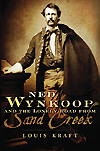
Ned Wynkoop and the Lonely Road From Sand Creek, by Louis Kraft, University of Oklahoma Press, Norman, 2011, $34.95
Occasionally a writer comes along whose labor-of-love research and fine body of work on a historic Western figure make him the authority on that particular Westerner. English author Joseph Rosa, with his deep, long-standing connection to Wild Bill Hickok, comes immediately to mind. Well, you can now put California author Louis Kraft and his connection to Ned Wynkoop in that same category. Kraft has already written extensively about Wynkoop, including a handful of articles for Wild West, and now he has produced the first full biography of an unusual fellow whose humanitarian stance toward Indians, empathy and “brave act of conscience” made him, in the eyes of many, a villain or a traitor.
Edward Wanshaer Wynkoop (1836–91), born in Pennsylvania, was a work in progress when he went to Kansas Territory in 1856. Like most other Americans, he began life on the frontier holding, as Kraft writes, “a host of prejudices.” In early Denver he had a short career as a sheriff and an even shorter theatrical career. During the Civil War he became a captain in the 1st Colorado Volunteer Regiment and then commander at Camp Weld, near the Colorado capital. Although acting without orders, he pulled off what he thought was a coup in 1864—getting Black Kettle and other chiefs to come to Denver to discuss peace. His superiors and the citizens of Colorado Territory did not see eye to eye with him, and Wynkoop became an outcast before, during and after the Colorado Volunteers’ infamous November 29, 1864, attack on Black Kettle’s village (the Sand Creek Massacre). He was not afraid to criticize the U.S. government’s treatment of Indians and walk the precarious line between whites and Indians. After leaving the military in July 1866, he tried to help the Cheyennes and Arapahos as an Indian agent (though he could not prevent war), spoke out against Lt. Col. George Custer’s attack at the Washita (in which Black Kettle was among the victims) and resigned from the Indian Bureau on November 29, 1868. It only looked like the end of Wynkoop’s time in the West. He returned to the frontier, specifically the Black Hills of Dakota Territory, in search of gold in 1875. That venture fizzled, and while he would hold other positions in the West, his deteriorating health and financial difficulties plagued him till the end of his days.
Certainly Wynkoop’s stance against the Sand Creek attack not only changed his life forever but also defines how he is remembered today. He had stepped beyond the accepted mores of the day and kept speaking his mind. Kraft compares Wynkoop to screen legend Errol Flynn, but Wynkoop’s life did not play out according to a Hollywood script. “Of course,” writes Kraft, “Flynn’s humanity and his stand for justice always won out by the final reel of the film, whereas Wynkoop walked away from the pinnacle of his life knowing he had failed.”
—Editor




